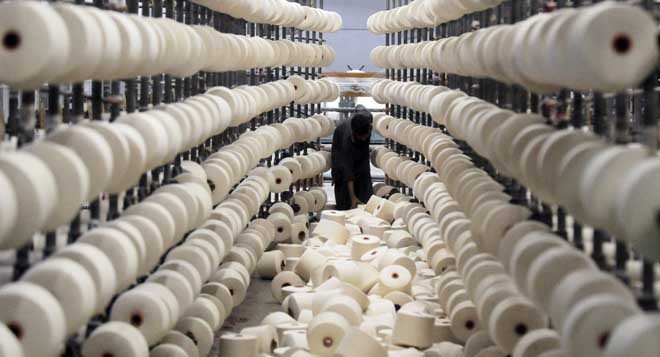

In what is being termed a great development, Pakistan has secured the long awaited duty-free access to the European markets, through the EU Generalised Scheme of Preferences (GSP) Plus status. The announcement was made in the second week of December 2013 though the regime actually came into force on January 1, 2014. There are 10 developing countries, including Pakistan, which will benefit from this decision.
Pakistan’s export-based industries are upbeat on this breakthrough and hoping to increase their exports to the EU considerably over the next few years. Maximum potential exists for the country’s textile industry, which can easily earn $1 billion extra every year.
Currently, Pakistan’s share in EU’s total imports of $ 275 billion per year is $ 5.41 billion, which comes to 1.48 per cent of the total imports to the region. Under the GSP plus status, the threshold for a beneficiary country has been set at 2 per cent of the total EU imports. This means Pakistan can now export duty-free goods worth $7.32 billion. The differential, which comes at $1.9 billion (the additional 0.52 per cent of the total EU imports), is the additional business which Pakistani exporters are vying for.
The basic concept is that EU’s GSP allows developing country exporters to pay lower duties on their exports to the EU. This gives them vital access to EU markets and contributes to their economic growth. The GSP plus status has been awarded to recipient countries for 10 years.
As mentioned in the EU’s official documents, there are three main variants (arrangements) of the scheme:
a) The standard GSP scheme, which offers generous tariff reductions to developing countries. Practically, this means partial or entire removal of tariffs on two-thirds of all product categories.
b) The "GSP+" enhanced preferences means full removal of tariffs on essentially the same product categories as those covered by the general arrangement. These are granted to countries which ratify and implement international conventions relating to human and labour rights, environment and good governance;
c) "Everything but Arms" (EBA) scheme for least developed countries (LDCs). EBA status grants duty-free quota-free access to all products, except for arms and ammunitions.
The GSP plus status is not awarded automatically. The countries aspiring to achieve it have to apply to the EU and undergo a due diligence process before getting it. Pakistan filed an application during the PPP government, followed it up during the interim government phase and got the approval in the current tenure of the PML-N.
"It was a continuous struggle and intense lobbying which paid in the end," says Anis-ul-Haq, Secretary, All Pakistan Textile Mills Association (APTMA), Punjab Zone. He says revision in the formula was one of the major factors that favoured Pakistan. Earlier, the countries whose exports to EU were less than 1 per cent of the latter’s total imports could qualify. Now the threshold has been increased to 2 per cent and Pakistan whose exports to EU comprise 1.48 per cent of its total imports has qualified.
Besides, he says, Pakistan has signed and ratified 27 international conventions. These include the international covenant on civil and political rights and economic social and cultural rights, international conventions on the elimination of all forms of racial discrimination, convention on the elimination of all forms of discrimination against women, convention on the rights of the child, convention on biological diversity, abolition of forced labour convention, Montreal protocol on substances that deplete the ozone layer, and Mexico UN convention against corruption.
Haq says the EU has done due diligence on these counts and given approval only after discovering that sincere efforts are being made to comply with the terms of these conventions. "No doubt, there is a long way to go but one can notice healthy trends in this regard. For example, there are pro-labour legislations underway, women have started coming into the mainstream, industry is opting for environment-friendly solutions and so on," he adds.
There will be a stronger push now as the European Parliament will monitor compliance of these international conventions. There will be first review of the situation after two years and after that the reviews will be carried out after every three years.
Aamir Fayyaz Sheikh, chairman of the international trade committee of APTMA, says Pakistan will have to diversify its product range and value-addition to make the best use of the GSP plus status. The reason he says is that under the scheme, there are separate thresholds for different products. Once a particular export items reaches its threshold, it can no more benefit from duty exemption.
That’s why, he says, APTMA’s international trade committee comprises representatives of knitwear industry, bed-linen industry, yarn spinning industry, weaving industry, garments industry, etc. "All of these, while they have to go for product development, modernisation, and value addition," he adds. Pakistanis are heavily dependent on cotton-made products. It should go for synthetic products which have a great demand in the EU.
The government, he says, can allow a special package to importers of synthetic raw material. "They can import it on low duty rates and export finished products, such as lingeries, undergarments, and sportswear to the EU. These products are needed in huge quantities in EU and may fetch high prices."
APTMA’s former chairman, Gohar Ejaz, urges the government to go for short-term, mid-term, and long-term solutions to make industry run its wheels. He says the textile industry is prepared to set up captive power plants which can run on different fuels, such as liquefied petroleum gas mix and coal. Import of LNG is one of the short-term solutions.
Haq says despite securing GSP plus, Pakistan is facing stiff competition from countries like Bangladesh due to several reasons. For example, unit price for electricity used buy industry in Pakistan is 15 cents as compared to 7 cents in Bangladesh. The minimum wage of Pakistani worker is almost double of what they get in Bangladesh.